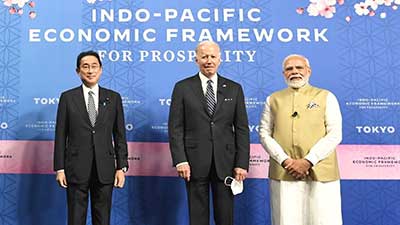Relevance: GS-2: Bilateral, regional and global groupings and agreements involving India and/or affecting India’s interests.
Key Phrases: Indo-Pacific Economic Framework for Prosperity, economic initiative, Supply chain resilience, Infrastructure, clean energy, decarbonisation, commerce, ASEAN, RCEP, free trade agreements.
Why in News?
- There is a dire need for a new institutional framework to govern global trade. IPEF could be the new beginning.
Context:
- At the recently concluded Quad summit in Tokyo, India joined the United States (US)-led Indo-Pacific Economic Framework for Prosperity (IPEF), created to provide an alternative trading arrangement and counter Chinese dominance in the region.
What is the Importance of the Indo-Pacific Region?
- Economically, the Indo-Pacific is a centre of global trade and commerce, and therefore a potential area of economic prosperity for the countries in the region.
- It accounts for 65 percent of the world’s population, 63 percent of the world’s GDP, and 46 percent of the world’s merchandise trade.
Indo-Pacific Economic Framework for Prosperity
- Indo-Pacific Economic Framework for Prosperity (IPEF) is an economic initiative launched by United States President Joe Biden on May 23, 2022.
- The framework was launched with a total of thirteen participating nations (together represent 40% of the world GDP), with an open invitation for other countries to join at any time.
- Biden described the initiative as "writing the new rules for the 21st century economy", stating that the agreement would make the participant's economies "grow faster and fairer". The framework constituted the most significant international economic engagement that the United States has ever had in this region.
What are the Four Pillars of IPEF?
- The four themes of the proposed IPEF are:
- Fair and resilient trade
- Supply chain resilience
- Infrastructure, clean energy, and decarbonisation
- Tax and anti-corruption
- Commerce will encompass the digital infrastructure and emerging technological innovations, labour commitments, the environment, trade agreements, transparency and strong regulatory practices, and corporate transparency, as well as norms for cross-border information flows and data localization. Distribution network resiliency is being developed in order to create "a first-of-its-kind supply chain deal" that will foresee and prevent outages.
- Green energy and decarbonisation, which include "high-ambition promises" such as renewable resource objectives, carbon removal acquiring agreements, power efficiency standards, and fresh efforts to control methane pollution.
- Tax and anti-corruption, involve agreements to legislate and implement effective tax, anti-money laundering, and anti-bribery initiatives in line with (American) value systems.
How IPEF Important for India?
The US-led Indo-Pacific Economic Framework for Prosperity (IPEF) is strategically important for India for four reasons.
- It will enhance India’s economic engagement in the region, which was dented after India’s withdrawal from the Regional Comprehensive Economic Partnership (RCEP) agreement.
- The IPEF will help control the damage caused by the RCEP withdrawal as all the IPEF members save India and the US—Australia, Brunei, Indonesia, Japan, South Korea, Malaysia, New Zealand, the Philippines, Singapore, Thailand, and Vietnam—are signatories to the RCEP.
- Building resilient supply chains is one of the motives of the IPEF. India can consider members as alternative sources for its raw materials requirements. Malaysia could increase the supply of chips, whereas Australia can be a source of minerals for Indian industry. This could reduce India’s overdependence on China for these inputs. Covid-19 has already shown how detrimental it is for industry to rely on a single source for inputs. Therefore, increasing inputs trade with the IPEF members can provide a cushion against future supply shocks.
- It will also help India strengthen its ties with Australia. Though India has just signed an interim Economic Cooperation and Trade Agreement with Australia in April 2022, there has been a change of government in Australia since. The bonhomie between the two countries that was there earlier needs nurturing by India. Engagements through the IPEF could provide a boost to India-Australia renewed ties.
- The IPEF can also support India’s renewed love for free trade agreements. IPEF membership is a testimony to India’s aggressive stance on bilateral and regional trade engagements. However, India needs to be cautious of what is achieved through this framework. There may be some slips that may affect India’s economic interests.
China's Reaction to IPEF:
- China has strongly criticized the IPEF, claiming that any agreement reached under it would be an "entirely clique" that would exacerbate the Indo-Pacific crisis. Chinese Foreign Minister stated that the US's efforts to control China are "destined to fail" and questioned whether the IPEF forces nations to choose between Washington and Beijing.
- China quoted thatUS attempting to ramp up worldwide financial restoration, or causing financial decoupling, innovation blockade, factory chain disruption, and exacerbating the distribution network crisis.
Way Forward:
- The IPEF principles on climate change appear as a broad initial attempt to develop rules for technology transfer for key technologies that would attempt to balance the interests of both the technology owner and the recipient user. Very importantly, the official IPEF statement clearly mentions that it intends to address a more expansive set of areas in the future.
- IPEF therefore clearly represents the beginnings of developing an alternative set of rules and frameworks to address the needs of the new trading system and production networks that have emerged in the last decade or so, and right the wrongs of the existing institutional framework that failed to enforce the principles of fairness and transparency where it was most needed.
- This is the great rebooting. It is not intended to be a closed system to exclude any country, but participation would require a commitment to openness, transparency and market principles that certain large economies would find difficult to comply with.
Source: India-Times
Mains Question:
Q. What is Indo-Pacific Economic Framework for Prosperity? How IPEF is beneficial for India? Examine.







